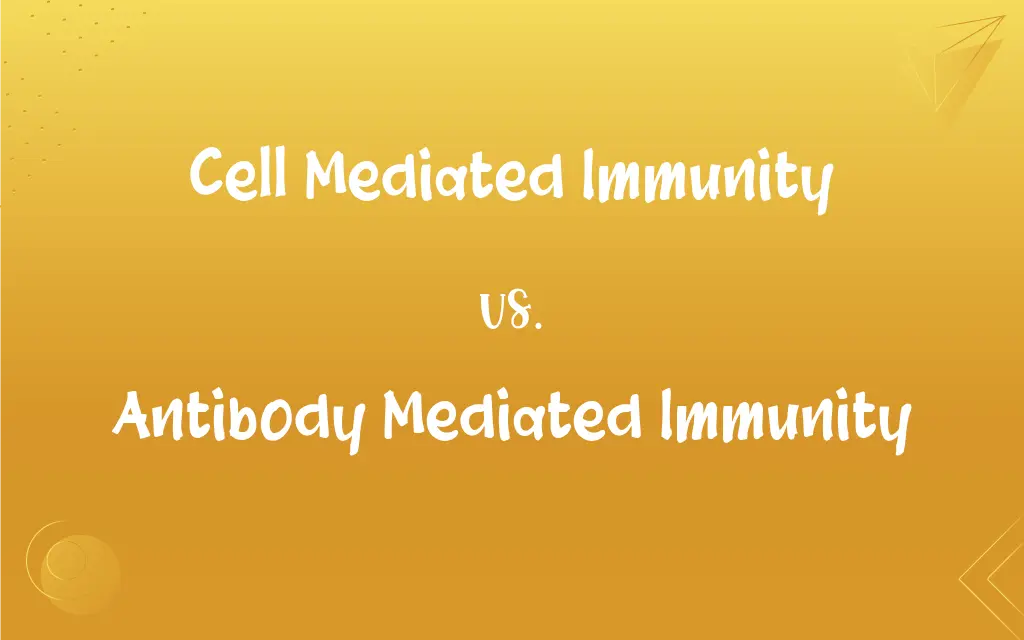Cell Mediated Immunity vs. Antibody Mediated Immunity: What's the Difference?
By Harlon Moss & Janet White || Published on March 13, 2024
Cell-mediated immunity involves T cells targeting and destroying infected or abnormal cells, crucial for intracellular pathogens. Antibody-mediated immunity, driven by B cells and the production of antibodies, targets extracellular pathogens and toxins.

Key Differences
Cell-mediated immunity is a branch of the adaptive immune system primarily involving T cells, including cytotoxic T cells, helper T cells, and regulatory T cells. This type of immunity is key in fighting intracellular pathogens, such as viruses and some bacteria, that reside within host cells, making them inaccessible to antibodies. Antibody-mediated immunity (also known as humoral immunity) involves B cells that differentiate into plasma cells to produce antibodies. Antibodies are specific proteins that bind to antigens on the surface of pathogens or infected cells.
Both arms of the adaptive immune system are interconnected; for example, helper T cells are crucial for fully activating B cells, leading to the production of high-affinity antibodies. While cell-mediated immunity does not involve antibodies in its effector functions, it plays a critical role in controlling infections by directly targeting the cells hosting the pathogen. Conversely, antibody-mediated immunity primarily targets pathogens in the bloodstream and extracellular fluids.
The distinction between these two types of immunity is crucial for understanding how vaccines work, the body’s response to different pathogens, and the design of immunotherapies. Vaccines can be designed to elicit a strong cell-mediated response, an antibody-mediated response, or both, depending on the nature of the pathogen they are designed to protect against.
Comparison Chart
Primary Cells Involved
T cells (Cytotoxic T cells, Helper T cells, Regulatory T cells)
B cells (differentiate into plasma cells)
Target
Intracellular pathogens (viruses, some bacteria) and abnormal cells (cancer cells)
Extracellular pathogens (bacteria, viruses in bloodstream) and toxins
ADVERTISEMENT
Mechanism
Direct cell killing, activation and regulation of immune cells
Production of antibodies that neutralize pathogens or mark them for destruction
Role of Antibodies
Not involved directly
Central to the immune response
Type of Pathogens
Targets cells infected by pathogens or abnormal cells
Targets free-floating pathogens and toxins
Cell Mediated Immunity and Antibody Mediated Immunity Definitions
Cell Mediated Immunity
Critical for tumor surveillance.
T cells can recognize and eliminate cancerous cells.
Antibody Mediated Immunity
Targets extracellular pathogens.
Antibodies bind to bacteria, preventing them from infecting cells.
ADVERTISEMENT
Cell Mediated Immunity
Protects against intracellular pathogens.
Cell-mediated immunity is crucial for clearing intracellular bacterial infections.
Antibody Mediated Immunity
Can be transferred through passive immunity.
Maternal antibodies provide newborns with temporary immunity.
Cell Mediated Immunity
Does not involve antibodies.
T cell responses are independent of antibody production.
Antibody Mediated Immunity
Provides long-lasting immunity.
Memory B cells ensure rapid antibody production upon re-exposure to pathogens.
Cell Mediated Immunity
Regulated by helper and regulatory T cells.
Helper T cells enhance immune responses while regulatory T cells prevent autoimmunity.
Antibody Mediated Immunity
B cells produce antibodies.
Plasma cells secrete antibodies that neutralize toxins.
Cell Mediated Immunity
Involves T cells targeting infected cells.
Cytotoxic T cells destroy cells infected with the flu virus.
Antibody Mediated Immunity
Involves the complement system.
Antibody binding activates complement, leading to pathogen lysis.
FAQs
What is the main difference between cell-mediated and antibody-mediated immunity?
The main difference lies in their mechanisms and targets: cell-mediated immunity involves T cells targeting and destroying infected or abnormal cells, while antibody-mediated immunity involves B cells producing antibodies to neutralize or mark pathogens for destruction.
Can these types of immunity work together?
Yes, cell-mediated and antibody-mediated immunity often work together, with helper T cells playing a pivotal role in activating B cells to produce antibodies, illustrating the interconnectedness of the immune response.
How do vaccines stimulate these types of immunity?
Vaccines can stimulate cell-mediated immunity by presenting antigens that activate T cells, and antibody-mediated immunity by inducing B cells to produce specific antibodies. Many vaccines are designed to elicit both responses for comprehensive protection.
What role do regulatory T cells play in immunity?
Regulatory T cells help maintain immune tolerance, preventing autoimmune diseases by suppressing immune responses that are mistakenly directed against the body’s own cells.
How does the body remember previous infections or vaccinations?
The body remembers previous infections or vaccinations through the formation of memory cells. Memory T cells and memory B cells are long-lived cells that can quickly expand and mount an effective response upon re-exposure to the same antigen, providing long-lasting immunity.
What is the role of the complement system in antibody-mediated immunity?
The complement system, a group of proteins in the blood, works with antibodies to clear pathogens. Antibody binding to a pathogen surface can activate the complement cascade, leading to the direct lysis of the pathogen, enhancement of phagocytosis, and inflammation that recruits additional immune cells to the site of infection.
Why is cell-mediated immunity important in fighting viral infections?
Cell-mediated immunity is crucial for viral infections because it targets and eliminates cells infected by viruses, preventing the production of new viral particles and the spread of the infection.
How do antibodies neutralize pathogens?
Antibodies neutralize pathogens by binding to their surface antigens, blocking their ability to infect host cells, agglutinating them for easier removal, or activating the complement system to lyse the pathogens.
Can individuals have stronger cell-mediated immunity and weaker antibody-mediated immunity, or vice versa?
Yes, individuals can have variations in the strength of their immune responses due to genetic factors, age, nutritional status, and exposure to pathogens. Some may have a more robust cell-mediated response but a weaker antibody-mediated response, affecting their susceptibility to certain diseases and their response to vaccines.
What advancements have been made in manipulating these immune responses for therapy?
Advancements include monoclonal antibodies that target specific pathogens or cancer cells, vaccines that elicit strong cellular and humoral responses, immune checkpoint inhibitors that enhance T cell responses against cancer, and engineered T cells for targeted therapy, such as CAR-T cell therapy.
What is hybrid immunity and how does it relate to these types of immunity?
Hybrid immunity refers to the robust immunity acquired through a combination of natural infection and vaccination, leveraging both cell-mediated and antibody-mediated responses. Individuals with hybrid immunity have been shown to have a broad and effective defense against pathogens, including variants of concern.
Why is it important to balance cell-mediated and antibody-mediated immunity?
A balanced response ensures effective defense against a wide range of pathogens without causing excessive inflammation or autoimmunity. Overactivity or underactivity in either branch can lead to susceptibility to infections, chronic inflammation, or autoimmune disorders.
How are autoimmune diseases related to these types of immunity?
Autoimmune diseases can arise from failures in immune regulation, leading to the immune system attacking the body’s own cells. Both types of immunity can be involved, with autoantibodies (antibody-mediated immunity) targeting self-antigens and autoreactive T cells (cell-mediated immunity) attacking self-tissues.
How do allergies relate to these types of immunity?
Allergies are usually related to antibody-mediated immunity, specifically the inappropriate immune response to harmless antigens (allergens) involving IgE antibodies. These antibodies trigger mast cells to release histamine and other mediators, causing allergic symptoms.
Can stress affect cell-mediated and antibody-mediated immunity?
Yes, stress can affect both types of immunity. Chronic stress has been shown to suppress immune function, including reducing the production of antibodies and altering the activity of T cells, which can increase susceptibility to infections and potentially exacerbate autoimmune conditions.
How does aging impact these immune responses?
Aging can lead to immunosenescence, where the immune system's effectiveness declines. This can result in reduced production of new T and B cells, diminished response to vaccines, and a decrease in the diversity of the T cell repertoire, affecting both cell-mediated and antibody-mediated immunity.
What research is being done to improve vaccine responses in individuals with weak immunity?
Research focuses on adjuvants that enhance immune responses, novel vaccine platforms like mRNA vaccines that elicit strong cellular and humoral responses, and strategies to specifically target the elderly or immunocompromised individuals, such as higher vaccine doses or additional booster shots.
About Author
Written by
Harlon MossHarlon is a seasoned quality moderator and accomplished content writer for Difference Wiki. An alumnus of the prestigious University of California, he earned his degree in Computer Science. Leveraging his academic background, Harlon brings a meticulous and informed perspective to his work, ensuring content accuracy and excellence.
Co-written by
Janet WhiteJanet White has been an esteemed writer and blogger for Difference Wiki. Holding a Master's degree in Science and Medical Journalism from the prestigious Boston University, she has consistently demonstrated her expertise and passion for her field. When she's not immersed in her work, Janet relishes her time exercising, delving into a good book, and cherishing moments with friends and family.
































































